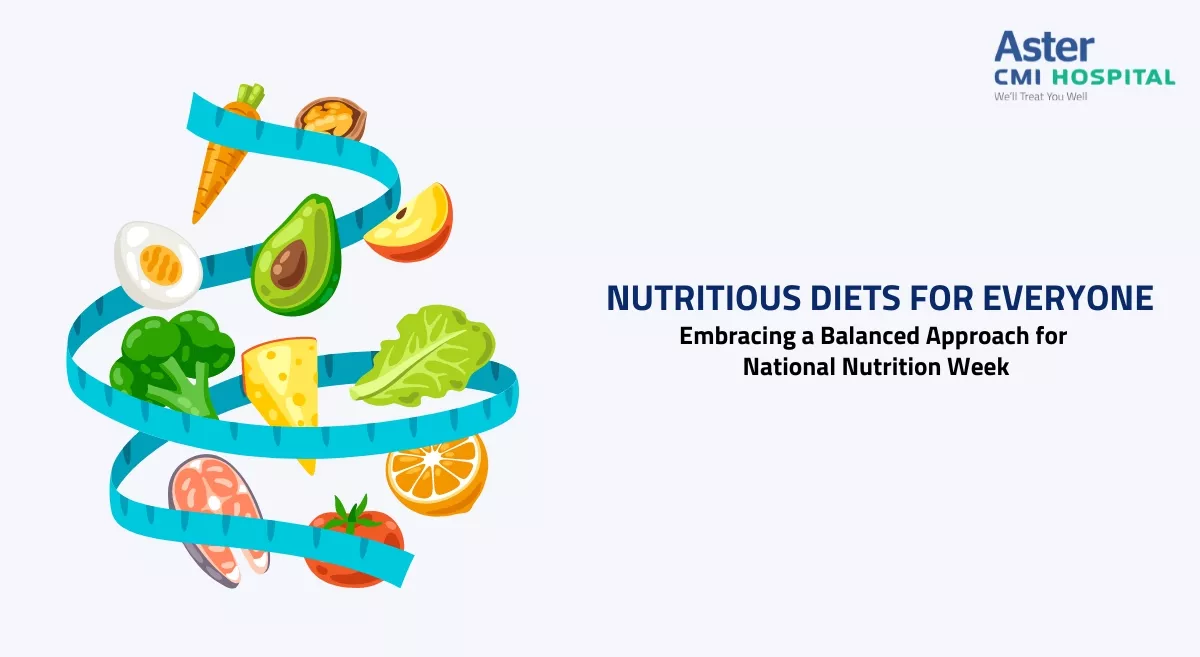National Nutrition Week serves as a vital reminder of the importance of making informed dietary choices to maintain overall health and well-being. This year’s theme, "Nutritious Diets for Everyone," emphasizes the universal need for balanced nutrition tailored to individual health requirements and lifestyles. At Aster CMI Hospital, a leading Internal Medicine Hospital in Hebbal Bangalore, we are dedicated to promoting the principles of good nutrition to help everyone achieve optimal health. This blog delves into the core aspects of nutritious diets, highlighting key dietary components, and offering practical advice to make healthy eating accessible for all.
Understanding Nutritious Diets
A nutritious diet is one that provides the essential nutrients your body needs to function optimally. These include macronutrients (carbohydrates, proteins, and fats), micronutrients (vitamins and minerals), and sufficient hydration. A well-balanced diet supports immune function, promotes growth and development, and reduces the risk of chronic diseases such as diabetes, cardiovascular disease, and obesity. If you experience nutrition-related or metabolic concerns, consulting experienced General Physicians in Hebbal Bangalore can help you receive appropriate medical guidance and support.
Key Components of a Nutritious Diet
- Macronutrients:
- Carbohydrates: Essential for energy, carbohydrates should come primarily from whole grains, fruits, and vegetables. They provide fiber, which aids digestion, helps reduce bad cholesterol, maintain stable blood sugar levels and spares protein to preserve muscle health.
- Proteins: Important for muscle repair and immune function, proteins should be sourced from lean meat, poultry, fish, legumes,nuts, seeds and plant-based proteins like soya tofu and tempeh.
- Fats: Healthy fats, such as those found in sea fish, avocados, nuts, seeds, and vegetable oil are vital for brain health and hormone production. Aim to reduce saturated fats and avoid trans fats.
- Micronutrients:
- Vitamins: Essential for various bodily functions, vitamins A, C, D, E, and K should be included through a diverse diet rich in fruits, vegetables, and fortified foods.
- Minerals: Key minerals such as calcium, potassium, iron, and magnesium support bone health, fluid balance, and oxygen transport. Sources include dairy products, leafy greens, nuts, sesame seeds,soya milk and lean meats.
- Hydration: Adequate fluid intake is crucial for maintaining hydration, aiding digestion, and supporting metabolic processes. Aim for at least 8 glasses of water a day, and include other hydrating beverages and foods like fruits and vegetables.
Embracing Prebiotics and Probiotics
In line with this year's theme, it’s essential to understand the roles of prebiotics and probiotics in a nutritious diet. These components support digestive health and overall well-being.
- Prebiotics: These are non-digestible fibers that stimulate the growth and activity of beneficial gut bacteria. Foods rich in prebiotics include garlic, onions, bananas, barley and whole grains. They help improve gut health and enhance nutrient absorption.
- Probiotics: These are live beneficial bacteria that contribute to a healthy gut microbiome. Probiotics can be found in fermented foods such as yogurt, buttermilk, pickled vegetable , fermented rice/roti/ sour breads,kefir, sauerkraut, and kimchi. They help maintain a balanced gut flora, improve digestion, absorption of nutrients and boost immune function.
Practical Tips for Implementing a Nutritious Diet
- Plan Balanced Meals: Aim for meals that include a variety of food groups. For example, a meal could consist of lean protein, whole grains, a variety of colorful vegetables, and a healthy fat source.
- Portion Control: Be mindful of portion sizes to avoid overeating. Use smaller plates and bowls, and listen to your body’s hunger and fullness cues.
- Limit Processed Foods: Minimize the intake of processed and sugary foods, which can contribute to health issues such as obesity and diabetes. Focus on whole, unprocessed foods.
- Incorporate Variety: Include a wide range of foods in your diet to ensure you’re getting all the essential nutrients. Experiment with different fruits, vegetables, grains, and proteins.
- Stay Hydrated: Keep a water bottle handy and drink fluids throughout the day. Include hydrating foods like cucumbers and melons in your diet.
- Seek Professional Guidance: For personalized dietary advice, consider consulting with a registered dietitian or nutritionist. They can provide tailored recommendations based on individual health needs and goals.
Conclusion
National Nutrition Week is an opportunity to reassess and improve our dietary habits, ensuring that we all have access to nutritious and balanced meals. By understanding the importance of a well-rounded diet and incorporating elements like prebiotics and probiotics, we can enhance our health and well-being. At Aster CMI Hospital, we are committed to supporting our community in making informed dietary choices that contribute to long-term health. Embrace the theme of "Nutritious Diets for Everyone" by making thoughtful food choices and promoting a culture of health and wellness.
Let’s celebrate National Nutrition Week by prioritizing our health and committing to a diet that nourishes both body and mind.











